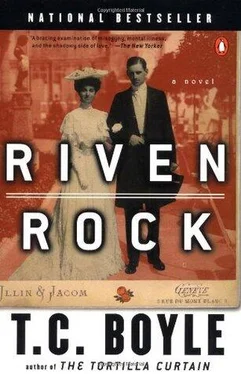T. Boyle - Riven Rock
Здесь есть возможность читать онлайн «T. Boyle - Riven Rock» весь текст электронной книги совершенно бесплатно (целиком полную версию без сокращений). В некоторых случаях можно слушать аудио, скачать через торрент в формате fb2 и присутствует краткое содержание. Год выпуска: 1999, Издательство: Penguin Books, Жанр: Современная проза, на английском языке. Описание произведения, (предисловие) а так же отзывы посетителей доступны на портале библиотеки ЛибКат.
- Название:Riven Rock
- Автор:
- Издательство:Penguin Books
- Жанр:
- Год:1999
- ISBN:нет данных
- Рейтинг книги:5 / 5. Голосов: 1
-
Избранное:Добавить в избранное
- Отзывы:
-
Ваша оценка:
- 100
- 1
- 2
- 3
- 4
- 5
Riven Rock: краткое содержание, описание и аннотация
Предлагаем к чтению аннотацию, описание, краткое содержание или предисловие (зависит от того, что написал сам автор книги «Riven Rock»). Если вы не нашли необходимую информацию о книге — напишите в комментариях, мы постараемся отыскать её.
Riven Rock — читать онлайн бесплатно полную книгу (весь текст) целиком
Ниже представлен текст книги, разбитый по страницам. Система сохранения места последней прочитанной страницы, позволяет с удобством читать онлайн бесплатно книгу «Riven Rock», без необходимости каждый раз заново искать на чём Вы остановились. Поставьте закладку, и сможете в любой момент перейти на страницу, на которой закончили чтение.
Интервал:
Закладка:
Stanley was about to say something, anything, a comment on the weather or the soup or the way the electric lights were holding up, just to throw his mother off the scent, but she was too quick for him.
“And this Negro music the young seem so eager to dance to, this ‘Maple Leaf Rag’ and all the rest of it, I suppose you find this sort of thing proper, do you?”
“I’m afraid I don’t have much time for dancing, Mrs. McCormick,” Katherine said, and she glanced up and down the length of the table before coming back to her again. “I’m very busy with my studies.”
“Yes,” Nettie said, all but spitting it out, “so I’m told. Snakes, isn’t it?”
The following afternoon, in a bleak cold rinsed-out light that made the whole city look as if it had been sunk to the bottom of Lake Michigan, Stanley and his mother escorted Katherine to Harold’s place in the landau — Nettie wouldn’t dream of setting foot in a motorcar — and had a tense lunch with Harold and Edith. The verbal sparring resumed over fricasseed chicken, boiled onions, beef tongue and ice cream, and continued through the farewells and out into the carriage. Stanley was at a loss. He should have been ebullient, irrepressible, kicking up his heels and shouting hosannas, because here were the two people he cared most about in the world, together at last, but instead he felt as if he’d gone into battle, a bewildered infantryman caught between opposing generals. “And your family, Katherine? I hear your father has passed on,” Nettie said, “and your mother never entertains,” and Katherine came back with, “Tell me about your other daughter, the older one — Mary Virginia?”
They’d just turned into Rush Street when Nettie suddenly rapped at the window and ordered the carriage to a stop. Perplexed, the driver climbed down and came to the window. “Ma‘am?” he said, showing his teeth in a nervous little grin.
“Where are you taking us?”
“Home, ma‘am. Six-seventy-five Rush Street.”
“Rush Street? Have you lost you senses? We have a guest with us, and she needs to be transported all the way back out to Astor Street, to the Martin residence.”
“But Mother,” Stanley was saying, “I told Stevens to drop you first, since we’re so close — I mean, there’s no need for you to—”
“Drop me? Whatever are you talking about? We’ve invited Miss Dexter, and we shall see her home. Really, Stanley, I’m surprised at you — where are your manners?”
“No, I, well — I was going to, well, see Miss Dexter home myself, after I, after we—”
“Nonsense.”
Katherine held her peace. Stevens stood there in the cold, the horses stamping and shuddering, the wind sending a fusillade of leaves and papers down the street in a sudden blast. Stanley was seated between the two women, and he didn’t dare look at Katherine, not on this battleground, not now. “I was only thinking of you, Mother, what with your heart condition and knowing how hard it is on your legs and the circulation to your, well, your feet, to, to sit cooped up like this, and I just, well, I just thought you’d be more comfortable at home.”
He watched his mother’s face tighten a notch and then suddenly let go, like an overwound spring. “All right,” she sighed, and now she was the invalid, the dying matriarch (who would, paradoxically, live another eighteen years in perfect health), too sick and enervated to fight. “It’s very thoughtful of you, Stanley. Drive on, Stevens,” she ordered in a diminished voice. And she was patient, biting her tongue until they’d arrived and Stanley was helping her up the walk and into the vestibule of the house while Katherine sat wrapped in her furs in the coach and watched her own breath crystallize in the stinging air. Then, just as the door shut behind them and Stanley was helping her off with her coat, his mother murmured, “Yes, Stanley, you’re right — and you’re such a dear to think of your poor old mother. Obviously, Stevens can see Miss Dexter home on his own and there’s no need at all for us to bother, with the weather so bitter — and that wind. It could even snow, that’s what they’re saying.”
“But, but”—Stanley was holding his mother’s coat out away from him as if it were the pelt of some animal he’d just bludgeoned and skinned—“I wanted to, that is I intended to take Katherine, I mean, Miss Dexter — to see her, I mean, home, that is—”
His mother turned a trembling face to him and took hold of his arm. “I won’t hear of it.”
“But no, no, you don’t understand. Katherine’s waiting for me.”
“Nonsense. You’re staying right here. You’ll catch your death out in that wind, and besides, it’s not proper you being all alone with her like that without a chaperone. Oh, maybe these modern girls think nothing of it, but believe you me, I, for one, won’t stand for it.”
Before he could think, Stanley had jerked his arm away. The blood was in his face, and he could hear the tick of the steam radiators and the faint sound of carolers off down the street somewhere. “I’m going,” he said, “and don’t try to stop me.”
His mother’s eyes boiled. Her face was like the third act of a tragedy. She swung an imaginary sword and cleaved the head from his body. “What,” she said, “you defy me?”
Stanley clenched his jaw. “Yes.”
And then they were struggling, actually wrestling at the doorway in plain sight of Katherine, his mother clutching at his arm as if she were drowning amid the crashing waves she herself had summoned up, and Stanley tore his arm away again, and he didn’t want to hurt her, not physically or emotionally, but when he broke loose she collapsed to the floor with a sob that sucked all the air out of him. It was the moment of truth. The moment he’d been awaiting for thirty years. He drew himself up, squared his shoulders and cinched the muffler tight against his throat. “I’m going now,” he said.
Katherine was waiting for him. Her eyes never left him as he emerged from the house, strode up the walk and climbed back into the carriage. He felt heroic, felt he could do anything — climb the Himalayas, beat back invading hordes, mush dogs across the frozen tundra. “Katherine,” he said, and she rustled beside him, her face turned to his, the carriage moving now and the rest of the afternoon and the city and everything in it left to them and them alone, “Katherine, I just wanted to, to—”
“Yes?” Her voice was lush and murmurous, floating up to meet his out of the depths of the gently swaying compartment. A fading watery light flickered at the windows. Stanley dreamed he was in a submarine, rising up and up, insulated from everything.
“Well, to tell you—”
“Yes?”
“About Debs, Debs and what he said in the paper the other — the other, well, day. It was the most significant thing I‘ve—” but he couldn’t go on. Not really. Not anymore.
In February, in Boston, they became secretly engaged. Stanley had come down by train and set himself up with rooms at the Copley Plaza just after Groundhog Day. After a week of hemming and hawing and discoursing on Jack London’s childhood, labor unions, black lung disease and the will he’d executed leaving all his moneys and possessions to be divided equally among the 14,000 McCormick workers, he put another hypothetical proposal to her and she amazed and exalted him by accepting. But only on the condition that they keep the engagement confidential till the end of the term, because the papers were sure to take it up — BOSTON SOCIALITE TO WED M‘CORMICK HEIR — and it would just be too much of a distraction in light of her thesis and exams. They had a celebratory dinner with Josephine, who swore to keep their secret and delivered a breathless monologue on the cruciality— Was that a word? of preserving the Dexter line, not to mention the Moores and McCormicks— And who were his mother’s people? — and how she hoped Katherine wouldn’t stop at four or five children, what with the threat of disease in the world today, and did Stanley know how they’d lost Katherine’s brother, the sweetest boy there ever was?
Читать дальшеИнтервал:
Закладка:
Похожие книги на «Riven Rock»
Представляем Вашему вниманию похожие книги на «Riven Rock» списком для выбора. Мы отобрали схожую по названию и смыслу литературу в надежде предоставить читателям больше вариантов отыскать новые, интересные, ещё непрочитанные произведения.
Обсуждение, отзывы о книге «Riven Rock» и просто собственные мнения читателей. Оставьте ваши комментарии, напишите, что Вы думаете о произведении, его смысле или главных героях. Укажите что конкретно понравилось, а что нет, и почему Вы так считаете.












